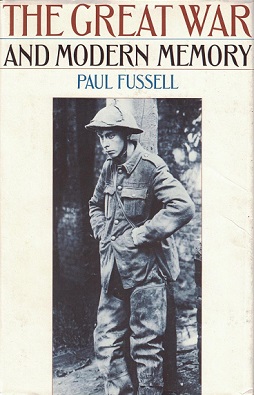The Great War and Modern Memory facts for kids

First edition
|
|
| Author | Paul Fussell |
|---|---|
| Country | United States |
| Language | English |
| Genre | Literary criticism |
| Publisher | Oxford University Press |
|
Publication date
|
1975 |
| Media type | |
| ISBN | 0-19-513331-5 |
The Great War and Modern Memory is a book by Paul Fussell. It was published in 1975 by Oxford University Press. The book explores how English writers in World War I described their experiences. It focuses on fighting, especially in trench warfare.
Many writers felt the war was pointless and crazy. This feeling became a way for them to understand life. Fussell shows how the war changed people's ideas about art and writing. Before the war, people liked Romanticism, which was about beauty and nature. After the war, writing became more about harsh and difficult topics.
Contents
How the War Changed Writing
Fussell's book explains how the war deeply affected everyone. It made writers share similar feelings in their essays, letters, novels, and poems. This shared experience completely changed how they saw the world.
Paul Fussell later explained in 1996: "I was very interested in the Great War. It was the first big shock to European culture in the 1900s. By the time of World War II, people were more used to war. But the Great War introduced these themes. It was a huge shock to people's minds, culture, and society."
Key Writers and Their Stories
Fussell writes about many people. He focuses on four important English writers. These writers changed their style or became famous during their time fighting on the Western Front. They are Edmund Blunden, Robert Graves, Wilfred Owen, and Siegfried Sassoon.
The experiences of trench warfare affected what these writers created. If they survived the war, their experiences shaped their writing for the rest of their lives.
Awards and Recognition
The Great War and Modern Memory won several awards. It received the last National Book Award in the Arts and Letters category. It also won the first National Book Critics Circle Award for Criticism. The Modern Library ranked it #75 on its list of the 100 best non-fiction books of the 20th century.
What Others Thought of the Book
Some historians have shared their thoughts on Fussell's book.
Different Views of the War
In 1995, historian Jay Winter said that Fussell's book missed some things. He felt Fussell didn't include writers who used older, more traditional ways to describe their feelings. Winter believed that people still used old ideas to talk about sadness and loss. So, he didn't think the Great War was the only time "modern memory" began.
Dan Todman agreed with this in 2005. He said Fussell chose texts that only supported his own ideas. This made him miss other ways writers reacted to the war. Some writers did try new styles. But others went back to comforting traditions. Todman said Fussell's book was more about arguing a point than truly analyzing everything.
Todman also pointed out that many of Fussell's main writers were from rich families. They went to special English schools. This meant they might not have understood how ordinary soldiers felt. Todman believed that regular soldiers often read authors like Rudyard Kipling. Kipling wrote about the war in ways that honored old traditions of soldiers.
Literary Study vs. History
In 2014, Daniel Swift wrote in History Today. He noted something interesting about the book. He said it was excellent for studying the literature and language of the Great War. It was great at looking at the metaphors and myths of the war. But Swift also felt the book was not as strong when it talked about history before and after the war. He called it "great literary criticism and lousy history."
 | Ernest Everett Just |
 | Mary Jackson |
 | Emmett Chappelle |
 | Marie Maynard Daly |

